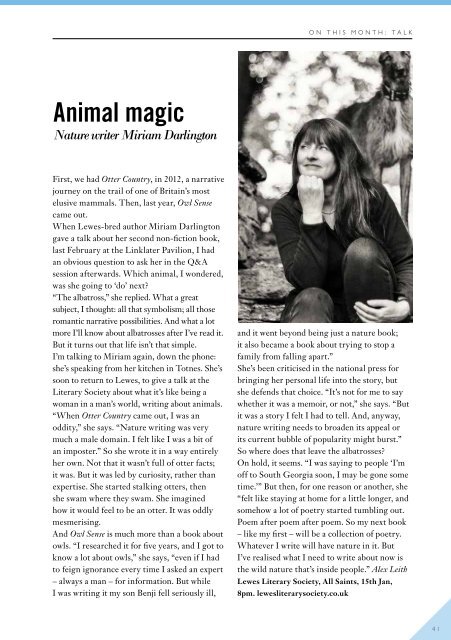Viva Lewes Issue #148 January 2019
You also want an ePaper? Increase the reach of your titles
YUMPU automatically turns print PDFs into web optimized ePapers that Google loves.
ON THIS MONTH: TALK<br />
Animal magic<br />
Nature writer Miriam Darlington<br />
First, we had Otter Country, in 2012, a narrative<br />
journey on the trail of one of Britain’s most<br />
elusive mammals. Then, last year, Owl Sense<br />
came out.<br />
When <strong>Lewes</strong>-bred author Miriam Darlington<br />
gave a talk about her second non-fiction book,<br />
last February at the Linklater Pavilion, I had<br />
an obvious question to ask her in the Q&A<br />
session afterwards. Which animal, I wondered,<br />
was she going to ‘do’ next?<br />
“The albatross,” she replied. What a great<br />
subject, I thought: all that symbolism; all those<br />
romantic narrative possibilities. And what a lot<br />
more I’ll know about albatrosses after I’ve read it.<br />
But it turns out that life isn’t that simple.<br />
I’m talking to Miriam again, down the phone:<br />
she’s speaking from her kitchen in Totnes. She’s<br />
soon to return to <strong>Lewes</strong>, to give a talk at the<br />
Literary Society about what it’s like being a<br />
woman in a man’s world, writing about animals.<br />
“When Otter Country came out, I was an<br />
oddity,” she says. “Nature writing was very<br />
much a male domain. I felt like I was a bit of<br />
an imposter.” So she wrote it in a way entirely<br />
her own. Not that it wasn’t full of otter facts;<br />
it was. But it was led by curiosity, rather than<br />
expertise. She started stalking otters, then<br />
she swam where they swam. She imagined<br />
how it would feel to be an otter. It was oddly<br />
mesmerising.<br />
And Owl Sense is much more than a book about<br />
owls. “I researched it for five years, and I got to<br />
know a lot about owls,” she says, “even if I had<br />
to feign ignorance every time I asked an expert<br />
– always a man – for information. But while<br />
I was writing it my son Benji fell seriously ill,<br />
and it went beyond being just a nature book;<br />
it also became a book about trying to stop a<br />
family from falling apart.”<br />
She’s been criticised in the national press for<br />
bringing her personal life into the story, but<br />
she defends that choice. “It’s not for me to say<br />
whether it was a memoir, or not,” she says. “But<br />
it was a story I felt I had to tell. And, anyway,<br />
nature writing needs to broaden its appeal or<br />
its current bubble of popularity might burst.”<br />
So where does that leave the albatrosses?<br />
On hold, it seems. “I was saying to people ‘I’m<br />
off to South Georgia soon, I may be gone some<br />
time.’” But then, for one reason or another, she<br />
“felt like staying at home for a little longer, and<br />
somehow a lot of poetry started tumbling out.<br />
Poem after poem after poem. So my next book<br />
– like my first – will be a collection of poetry.<br />
Whatever I write will have nature in it. But<br />
I’ve realised what I need to write about now is<br />
the wild nature that’s inside people.” Alex Leith<br />
<strong>Lewes</strong> Literary Society, All Saints, 15th Jan,<br />
8pm. lewesliterarysociety.co.uk<br />
41


















